- In 1992, the UN General Assembly adopted a resolution calling for Security Council reforms, reflecting three major complaints. To address these, UN Secretary-General Kofi Annan launched an inquiry on 1st January 1997.
- Criteria for new permanent members were discussed, including being a major economic and military power and a key UN budget contributor. Different countries supported or opposed these based on their own interests. Some also demanded the abolition of veto power, viewing it as undemocratic and against the principle of sovereign equality.
- Permanent members enjoy two privileges: veto power and permanency. Veto power allows any permanent member to block a decision. However, removing it could risk losing the support of powerful nations, making the UN ineffective.
International Organisations Class 12 Political Science
What are International Organisations?
International organisations are groups formed when different countries make agreements or treaties to work together on shared issues that go beyond their own borders.
These organisations serve as platforms for cooperation, coordination, and collaboration among member states to tackle various global challenges, ranging from economic development and trade to peace and security, environmental protection, human rights, and public health.
What is the Need for International Organisations?
- To solve problems that no country can solve alone.
- To bring about an agreement between the countries.
- To establish cooperation between countries.
- To reduce the possibility of war in the world.
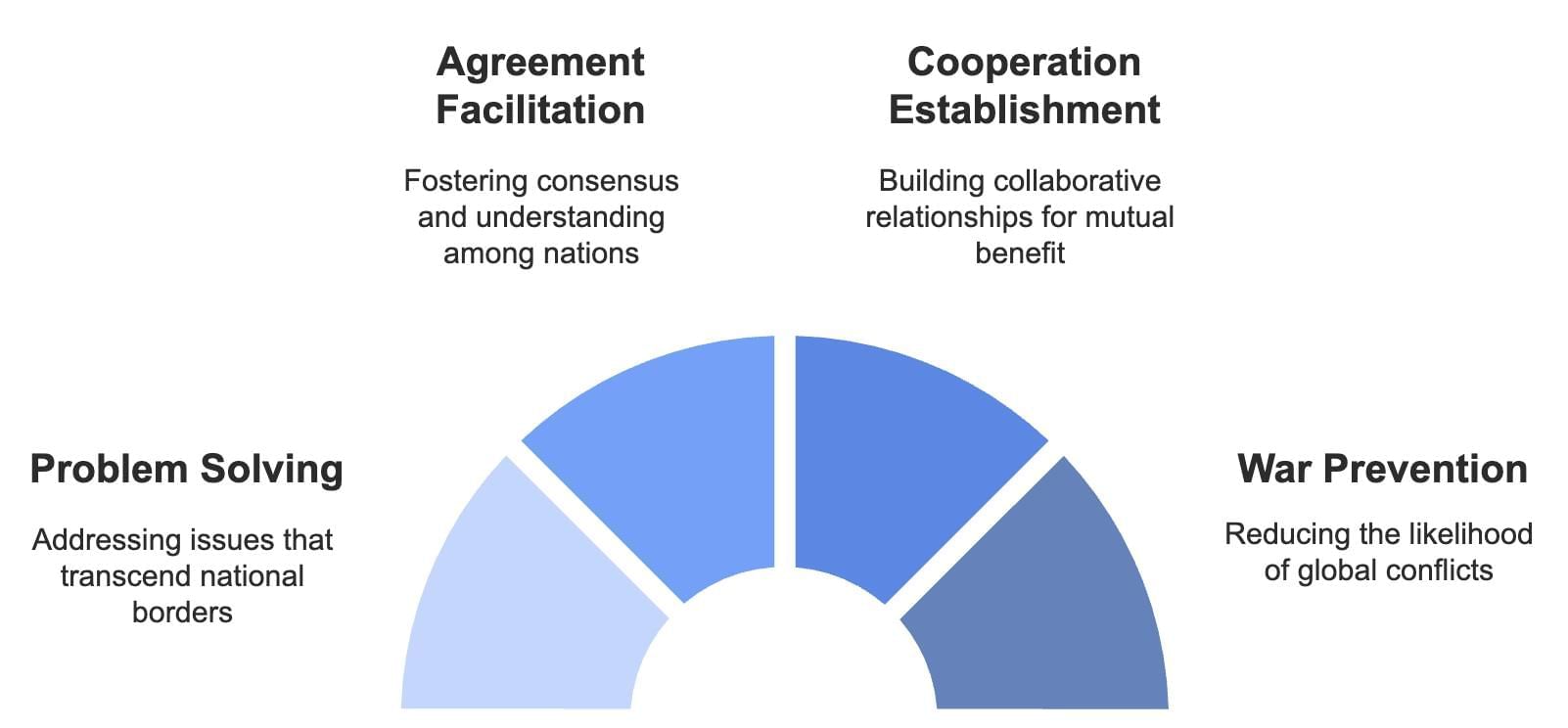
Evolution of The United Nations [UN]
- The United Nations was established in 1945, immediately after the Second World War. It was a successor to the League of Nations, which was formed after the First World War.
- The First World War led to the creation of an international group to handle conflicts, aiming to prevent future wars. This led to the establishment of the League of Nations.
- Despite some success initially, the League couldn't stop the Second World War, where more casualties occurred than ever before.
- The United Nations (UN) was formed after the Second World War to succeed the League of Nations. It started in 1945 with 51 countries signing the United Nations Charter.
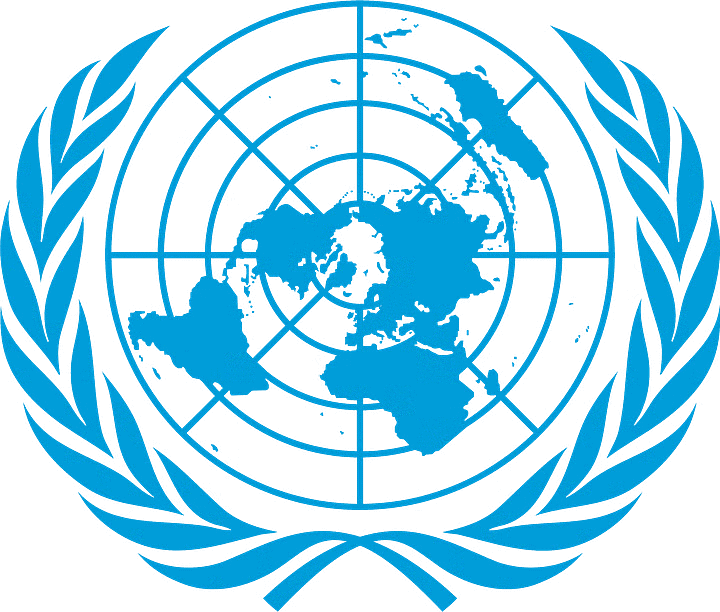 UN Emblem
UN Emblem
The UN aims to prevent conflicts between countries, promote cooperation, and stop small disputes from becoming wars. It also works to reduce the impact of any conflicts. Recognising that many conflicts arise from social and economic issues, the UN supports global development.
By 2011, the UN had 193 member states, representing nearly all independent nations. In the General Assembly, each member gets one vote. The Security Council has five permanent members—the US, Russia, the UK, France, and China—chosen for their power after World War II. The Secretary-General, currently António Guterres, is the UN’s chief representative.
The UN includes various agencies that address war, peace, development, health (WHO), human rights (UNHRC), refugees (UNHCR), children’s welfare (UNICEF), and education and culture (UNESCO).
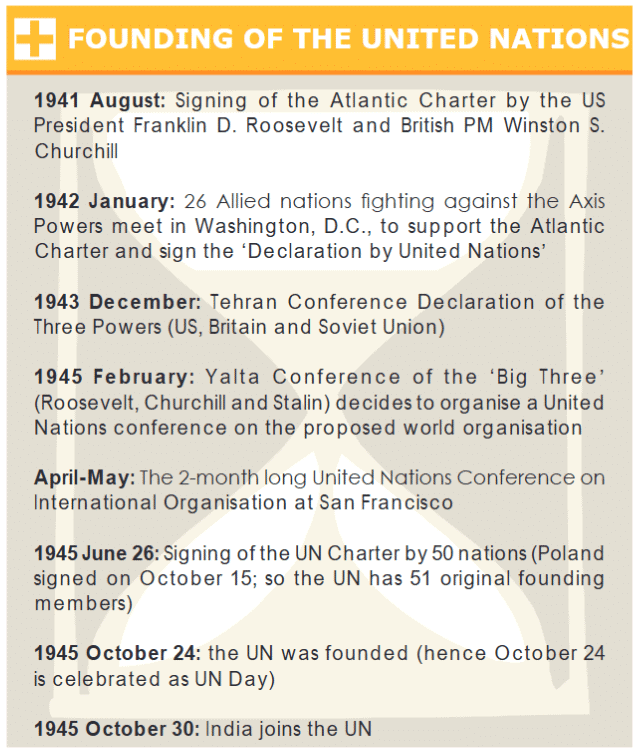
Principal Organs of the UN
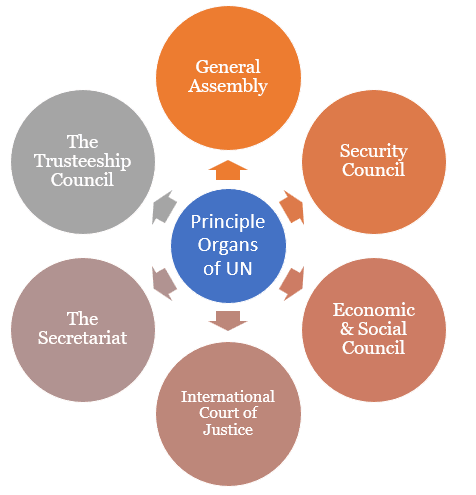
1. Security Council
Features of the Security Council
- The Security Council is the most important organ of the UN.
- There are 15 members in the Security Council, which are divided into 2 parts.
- Five permanent members (USA, France, UK, China and Russia)
- Temporary 10 members (These members are elected for 2 years)
- Each permanent member has a special power called VETO (prohibition).
- The permanent member can withhold or limit the motion by exercising the VETO.
Functions of the Security Council
- Resolving disputes between countries
- Keep peace in the world
- Punishing those who disturb the peace
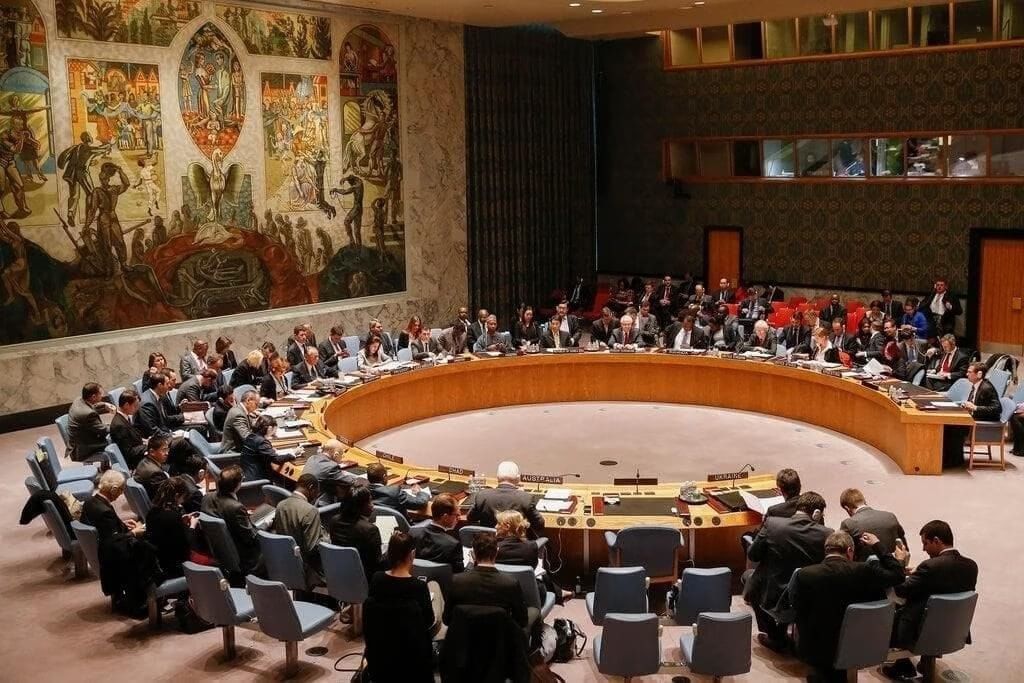 UN Security Council
UN Security Council
2. Secretariat
- The bureaucracy of the UN is called the Secretariat.
- The secretariat is the body of all the employees working for the UN.
- It informs the rest of the organs of the UN and keeps an account of their work.
3. Economic and Social Council
- The Economic and Social Council works for cultural, economic, social and educational development in the world.
- Establishment – 1945
- Present members – 54
- Meeting – The meeting of this council is held twice a year.
In Geneva in July
In New York in April - Its objective is to raise the level of economic, social, educational and cultural development in the world.
4. General assembly
- The General Assembly is a principal organ of the UN.
- In the general assembly, all the members of the UN are given one vote
- The general assembly is like the parliament of a country, where disputes are discussed.
- In the general assembly, decisions on general matters are taken by a general majority, and decisions on some special subjects are taken by a two-thirds majority.
- Its conference is held every year.
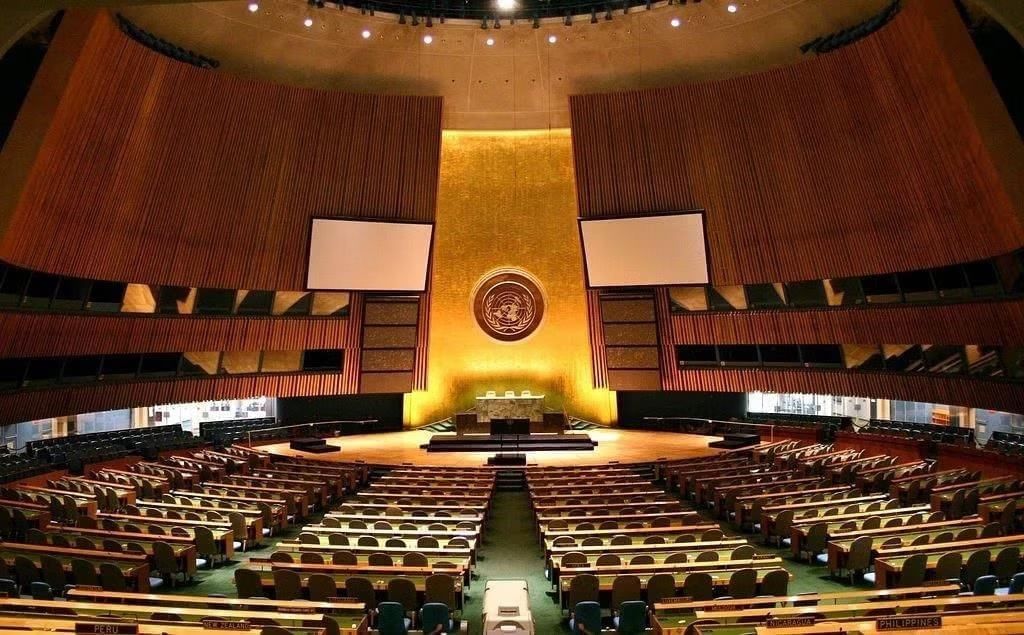 UN General Assembly
UN General Assembly
5. International Court of Justice
- The International Court of Justice settles disputes between countries.
- It is located in the Hague (Netherlands)
- The International Court of Justice consists of 15 judges who are elected for 9 years.
- After every 3 years, 5 judges are elected.
- All decisions are taken by majority vote.
6. Trusteeship Council
- The Trusteeship Council was created to look after those areas which were not able to maintain governance on their own after the Second World War.
- It was the responsibility of the Trusteeship Council to look after these areas.
- Initially, 11 territories were placed under its supervision.
- Its work ended after the independence of Palau in 1994.
Reform of the United Nations after the Cold War
- Reform is essential for any organisation to keep up with change, and the UN is no exception. While there's broad agreement that the UN needs improvement, there is little consensus on how to achieve it. Two key areas of reform are its structure and the issues it addresses.
- The debate centres on the Security Council, with many calling for expanded membership to better represent Asia, Africa, and South America. Western nations push for better budgeting and administration. Some want the UN to prioritise peace and security, while others stress development and humanitarian work like health, education, and human rights.
- Founded in 1945, the UN reflected the post–World War II world. Since then, the Cold War has ended, the Soviet Union dissolved, and the US emerged as a dominant power. China and India are rising, Asia’s economies are growing, and many new countries have joined, bringing new challenges like terrorism, climate change, and genocide.
- Since the late 1980s, member states have questioned whether the UN is equipped for today’s world and continue to seek ways to improve its effectiveness.
Reform of Structures and Processes of the UN
Jurisdiction of the UN
As the UN completed 60 years of its existence, the heads of all the member states met in September 2005 to celebrate the anniversary and review the situation.
The leaders in this meeting decided that the following steps should be taken to make the UN more relevant in the changing context:
- Creation of a Peacebuilding Commission
- Acceptance of the responsibility of the international community in case of failures of national governments to protect their own citizens from atrocities
- Establishment of a Human Rights Council (operational since 19 June 2006)
- Agreements to achieve the Millennium Development Goals (MDGs)
- Condemnation of terrorism in all its forms and manifestations
- Creation of a Democracy Fund
- An agreement to wind up the Trusteeship Council
India and the UN Reforms
- India has consistently supported UN reform, believing a stronger UN is needed in a changing world. Its key demand is the restructuring of the Security Council, with more permanent and non-permanent members to ensure broader global representation.
- India seeks a permanent seat, citing its status as the world’s largest democracy, the second most populous country, and growing economic influence. However, some countries oppose India’s inclusion due to concerns over Indo-Pak relations and nuclear capabilities.
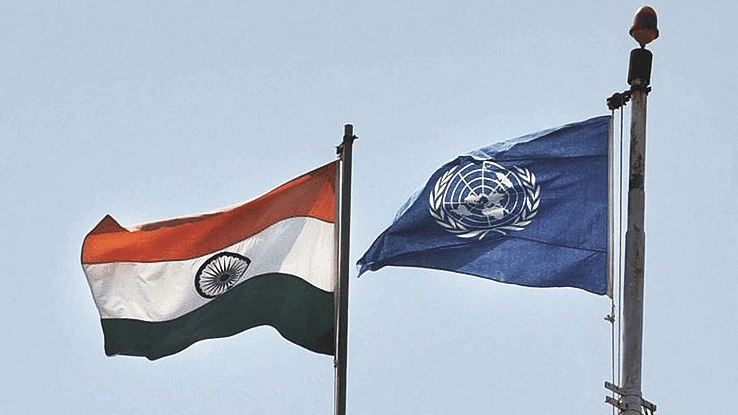
The UN in a Unipolar World
- Many countries believe that UN reform could help it function better in a unipolar world dominated by the US, especially after the USSR’s disintegration.
- The US holds significant influence in the UN due to its financial contributions and global power, making it hard to counterbalance. While the UN cannot fully check US power, it still serves as a platform for global dialogue.
- Though imperfect, the UN plays a crucial role, and it's important for countries to support and engage with it in line with their own interests.
Other International Organisations
- The International Monetary Fund (IMF) is an international organisation that looks at international financial institutions and regulations. It has 188 member countries. The G-8 members (the US, Japan, Germany, France, UK, Italy, Canada, Russia), China and Saudi Arabia have more than 52 per cent votes in the IMF.
- The World Bank is an important international organisation created during the Second World War in 1944. It provides loans and grants to the member countries, especially developing countries.
- The World Trade Organisation (WTO) is an international organisation set up in 1995 as the successor to the General Agreement on Trade and Tariffs (GATT). It sets the rules for global trade. As of 2024, the WTO has 164 member countries.
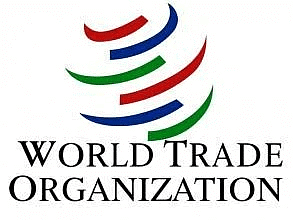
- The International Atomic Energy Agency (IAEA) is an international organisation established in 1957. It seeks to promote the peaceful use of nuclear energy and to prevent its use for military purposes.
- Amnesty International is an international Non-Governmental Organisation (NGO) which campaigns for the protection of human rights all over the world.
- Human Rights Watch is an international NGO which is involved in research and advocacy on human rights.
|
34 videos|308 docs|51 tests
|
FAQs on International Organisations Class 12 Political Science
| 1. What are International Organisations and what roles do they play in global governance? |  |
| 2. How has the United Nations evolved since its inception? |  |
| 3. What reforms have taken place in the United Nations after the Cold War? |  |
| 4. What is the jurisdiction of the United Nations? |  |
| 5. How does India view UN reforms and what role does it play in advocating for these changes? |  |

















